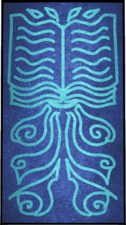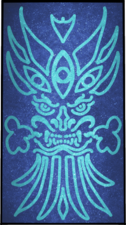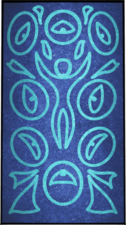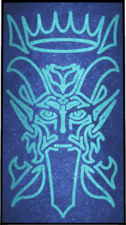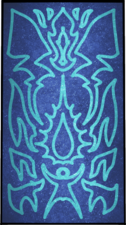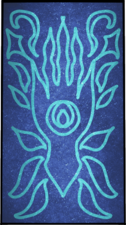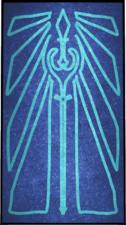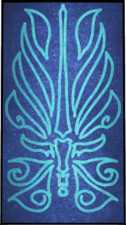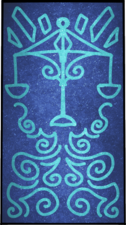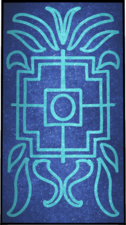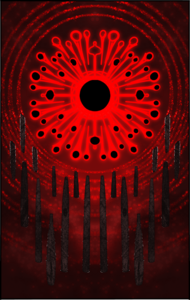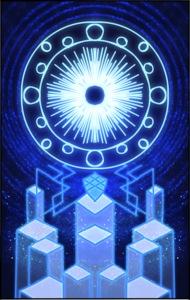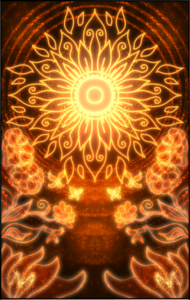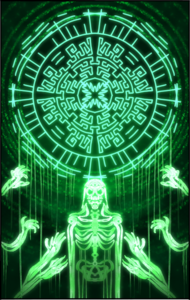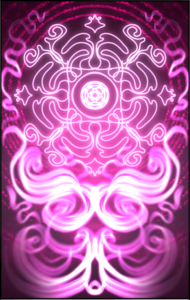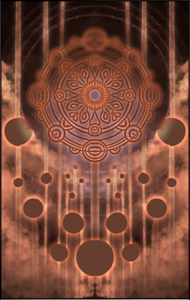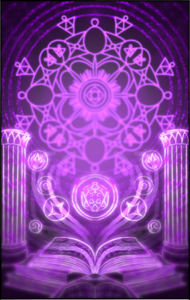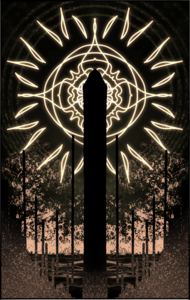More actions
Introduction
Magic is the act of changing the laws of physics, reality, and matter in the world of Aloria by drawing upon other dimensions to break the rules of said world. Magic has a different meaning in nearly all societies, with many Heritages split between loving Magic and hating it. This page explains the logic behind Magic in Aloria. The recommended reading portion is at the top, with an optional section called Expanded Lore at the bottom. However, before tackling what is on the page, you may look for one of the sub-topics of Magic, which are linked below.
-
Magic Schools covers Spell usage.
-
Demonology covers Demon lore.
-
Playing Demon covers playable Demons.
-
Arken covers god-like Demons.
-
Arkenborn covers playable Demi-Demons.
-
Curses covers how to use Curses.
-
Artifacts covers magical Artifacts.
-
Aelrrigan Order covers the Mage-Police.
-
Occult Law covers Magic State law.
-
Veilwalking covers extra Lore.
Note: Demonology, Demons, and Curses are still under development.
Quick Start
This section will discuss how to tackle this page as quickly as possible to get into Roleplay as soon as possible. This page can be read in connection with, or without the Proficiency page, as the choices here are mostly aesthetic and do not reflect in Combat Roleplay (which requires Proficiencies).
- Step 1 Read the Dimensions section and decide on 1 or multiple dimensional alignments for your Character.
- Step 2 Read the Learning section and decide what type of Origin and Training your Mage Character has.
- Step 3 Read the Regalia section so you have a general expectation of what Magic Roleplay is like.
- Step 4 Read the Magic Schools section and select some Schools for your Character.
- Step 5 Remember this information, or write it on your Character Sheet. You are now finished, but you can read the Expanded Lore for more information!
The Expanded Lore section is overwhelmingly long, and we understand if it feels intimidating. If you want to tackle it eventually but need an indicator of which sections are the most important, we recommend Arcane Harmony, Magic Costs, Risks of Magic, which are most likely to come up in Roleplay. The other sections are roughly ordered in how likely you are to run into them in conversations, but you can just feign ignorance on those topics.
Dimensions
Aloria is protected by an imperceivable barrier called the Veil that separates it from the other dimensions. Magic users learn to grasp this Veil and breach it to draw energy from the other dimensions, which is then used as fuel to create Magic in Aloria. You can align with more than one realm, but we recommend sticking to one or two alignments. While all Mages can breach the Veil in the same way, each Dimension exists somewhere else in the ether. To be "Aligned" means to know how to find them beyond the Veil, connect to them, and draw power from them. This page mostly contains an abbreviated analysis of the Realms that allows you to make a decision. If you want a more in-depth analysis, see the Magic Realms Page.
- The Abyss is a realm of darkness, hedonism, and unrestrained freedom, where shadows and eternal red twilight seduce and overwhelm, hosting powerful Demons that seek to impose both liberation and corruption. It is opposed to the Eidolon and allied with the Vortex.
- The Eidolon is a realm of perfect angelic tranquility and geometric divine order, where harmony is achieved through strict dogma and harsh repression of deviancy, emphasizing stability and tradition and creating balance. It is opposed to the Abyss and allied with the Eternum.
- The Anima is a realm of abundant life and beauty filled with all manner of mystical critters and magical beasts, where immortal Fae wage endless wars of trickery and deceit, conscripting mortals to fight for their amusement. It is opposed to the Hollow and allied with the Dictat.
- The Hollow is a necropolis realm of death and finality, where tranquility exists alongside suffering and Demons either consume souls out of hatred of the living or guide mortals to peaceful ends in pity for their pain. It is opposed to the Anima and allied with the Silence.
- The Vortex is a realm of relentless change and defiance where chaos reigns and landscapes shift with every blink. Above all, it is a realm in defiance of fate, that nobody is beyond saving, beyond changing, or beyond redemption. It is opposed to the Eternum and allied to the Abyss.
- The Eternum is a realm of eternal stability and fixed destiny where unchanging beauty and the comfort of the familiar defy decay, yet bring the oppressive weight of immutability. Here, fate is dogmatically followed and obeyed. It is opposed to the Vortex and allied to the Eidolon.
- The Dictat is a realm of boundless knowledge and learning--an infinite library that stores every thought--from insights to drivel. Its Demons compulsively seek information and force it on anyone who mistakenly listens. It is opposed to the Silence, and allied with the Anima.
- The Silence is a realm of absolute emptiness where knowledge and ideas are erased, and Demons destroy thoughts and histories to ensure nothing remains. Its hunger is both the gift of forgetting and the grief of unknown losses. It is opposed to the Dictat and allied to the Hollow.
Alignment does not dictate the types of Magic you can learn. Healing Magic, for example, is not unique to the realm of life. Alignment is chosen for ideological reasons, and while the colors and themes are just guidelines, we recommend gravitating toward them for cohesive character design.
Learning
Magic can be learned several ways. While it is possible to learn different Dimensions or Schools of Magic at various points in one’s life, a Mage only first learns to connect with the Veil once, which is called their Mage Origin. Mage Origins are split into the following:
- Birth Origin refers to a Mage who was aligned to any realm from birth and manifested from an early age.
- Teaching Origin refers to a Mage who was aligned by being taught by a mentor or book.
- Blessing Origin refers to a Mage who was aligned as a gift or pact with a Demon, God, or another entity.
- Curse Origin refers to a Mage who first aligned as a result of a Curse from a Demon or object (never a person).
This choice relates to how a backstory pans out. E.g., children born with Magic in anti-Magic societies have a harsh childhood, while they have it easy in Magic societies. If you would like more detail about what societies and what cultures or religions are pro or anti-Magic, see the Societies and Magic page, but this is not required reading as it just goes in-depth about the individual societal attitudes which is only relevant for Character backstories once you feel comfortable expanding. No Origin makes a Mage better at casting Magic. Every Mage must be taught, as even Birth Origin Mages are amateurs despite their born inclination. On a closing note, Blessing Origin can also include what is commonly known in D&D as a Paladin design, a Holy Warrior granted Magic with a particular purpose, and a failure condition that can cause them to become fallen. For more information on this, refer to the Holy Warriors Page which contains Magic Alignment and information concerning the various types of Holy Warriors spread across the Religions.
After you decide on your character's Mage Origin, consider how your Character became better at using Magic and practiced. This is called Mage Training.
- Mentor Training refers to a Mage who was taught Magic by a singular or multiple Mage mentors.
- Book Training refers to a Mage who is largely self-taught, learning theory and techniques from books.
- Trial Training refers to a Mage who used a process of dangerous trial and error over any official education.
- School Training refers to a Mage who attended a prestigious Magical school or academy for learning.
- Divine Training refers to a Mage who has their knowledge granted to them by a god of their faith.
- Demonic Training refers to a Mage who learned Magic from a Demon or can only use it because of a possession.
You can learn different Schools of Magic with different Training at any stage in life. Generally, when someone asks “How did you learn Magic?” you should only have to reply broadly which of the above applies. See Magic Academies for a list of in-lore places of learning.
Regalia
Regalia, the place where most Roleplay takes place, has a constantly shifting attitude towards Magic. The story goes that Regalia is an Empire with a large Magic-using population, but with non-Mage rulers who are either afraid of or disgusted with Magic. Mages have contributed to saving the Regalian Empire numerous times from catastrophe, but are also immediately blamed for these events. Magic usage is also rife in the criminal underground, leading to a stilted view of how Magic could be used. Progressive forces always try to integrate Magic more into society but are stymied by conservatives who fight to keep Magic hidden. Magic is generally tolerated as long as the Mage casts responsibly and not in public or on the street without the necessary legal reprieve, for example, by being a Knight or having another form of legal exception to the law.
While the law is generally merciful and gentle, opinions on the ground can radically differ from person to person. There are radicals in society who want to hurt Mages for what they are despite the law protecting Mages and prohibiting their abuse. Some Demons seek to feed off Mages or possess them, while some anti-Magic radicals want to outright kill Mages. Mages are also often easy scapegoats for noble schemes, making the day-to-day living of a Mage a careful balancing act between living free and living with restraints to now draw too much attention. Your Mage Character will generally be liked by the majority population but may be randomly attacked by anti-Mage radicals or Demonic forces, while occasionally having to fend off the ignorant arm of the law that over-punishes and misunderstands Magic. For more information on the law, see Occult Law which details what a Mage can and cannot do in Regalia.
Magic Schools
Magic Schools have grouped ideologies and casting styles with pre-defined Spells that allow Mages to easily access the type of Magic they want to use. Magic Schools are universally available across the world, though some societies and cultures have a stronger cultural connection to specific Schools. The Magic Schools Page contains a list of all available and unavailable Schools that you can use, including easy-to-reference Mechanics that define how to use Magic outside of Combat Roleplay. The Magic Schools page contains all the relevant information but does not need to be tackled with the Proficiency system as the two do not interact. Limitations to the number of Schools and some thematic overlap can be found there.
Expanded Lore
This section is not necessary to read to use Magic in Roleplay. However, it contains a lot of technical information on how Magic works, its moral implications, and the place of Magic in Aloria. As such, to avoid some confusion in roleplay, it can still be a good read but can comfortably be delayed until later, as many of the problems that arise from Magic do not present themselves early on for new Characters.
The Veil
The Veil is an imperceivable barrier that separates the dimensions and realms from Aloria and even each other. The best way to think of the Veil is to picture a shell around the planet of Aloria itself that has cracks in it through which Magic breaks into Aloria. The Veil was once whole (meaning it was impossible to peer through to the other Dimensions), but due to the hubris of the Seraph Civilization, it was damaged, which, in turn, caused the Void Invasions to take place where legions of Abyss Demons tried to purge all life from Aloria. The Veil is currently largely intact but is still damaged from all events in history.
Mages use what their inner awareness can perceive through these cracks, to navigate through this otherwise imperceivable barrier. It stands to reason that should one day the Veil be completely healed, all Magic would be disabled in the world. Scholars, however, posit that this is, at best, a pipeline dream of purists and cannot conceivably happen until all traffic across the Veil ends simultaneously. Demons and Mages simply have no interest in breaking the connection, and it remains open for debate whether this is even possible as some gods and Arken exist both within their respective dimensions and Aloria at the same time with a tether of Magic. To many Alorians living their day-to-day lives, the Veil is largely irrelevant and never spoken of.
Elderlaw
Elderlaw, simply put, was the Magic before Magic, a form of doing magical things with energies native to Aloria that are understood to be indistinguishable from Magic in the modern era, but Draconists like to hand-wring it was somehow 'different' in the past. Elderlaw is the power of Dragons, a tool that shapes reality in the universe, but also creates the world of Aloria as it is known. The last civilization of mortals that had Elderlaw was the Seraph. After they damaged the Veil in their hunger for more Magic, the Dragons destroyed all knowledge of Elderlaw to prevent it from falling into the hands of mortals. It is still possible to learn Elderlaw but only through direct Dragon guidance, and they will generally have no reason to do so. This can always be discussed when encountering Dragon DM NPCs or during Divinium Summonings.
The closest a normal person can get to Elderlaw is by using Unicores from the Ley Point Buy category, through which they produce Unicores that are capable of interfacing with Dragon Sites. Dragon Sites are locations of great Elderlaw power built by Dragons thousands upon thousands of years ago to aid them in the Immortal War when they still waged war on Demons. These sites border somewhere between magical and technological, like magical radar installations or archives where Leystone constructs work as programmed by Dragons in their absence. By interfacing with these Dragon Sites, Unicores can draw on Elderlaw Magic that is indirectly powered by the Dragons, often without them knowing. Many Draconists consider this their birthright by faith but also consider it blasphemy if non-Draconists end up using Leytech and Unicores because it is all part of their belief system.
Dragon Sites are interconnected with so-called Leylines. Leylines are an imperceivable Elderlaw Magic highway that connects both Dragons and Dragon Sites across the world. While Aloria knows many gods (including Dragons, who are also gods), gods are not omniscient or omnipotent. More often than not, are gods (and Dragons subsequently) limited by what they can see. For conventional gods, this is more intangible, as they have some awareness projected by their followers, but Dragons are extremely limited in what they can see and hear wherever they are. The Leylines, however, extend their awareness across the planet, but it should still not be thought of as infallible because the system creates a crude awareness, not an in-depth knowledge of local events. The Leylines are completely inaccessible to Mages, though sometimes Demons break into them, which is problematic since it grants Demons the ability to extend their influence far and wide and corrupt the network from within, which has further serious ecological consequences.
Arcane Harmony
Arcane Harmony is the concept of magical strength through harmonizing realms or alignments. A Mage who aligned with opposing or many realms, for example, has reduced Arcane Harmony because their soul becomes conflicted by the many facets of the realms they are connected to. A Mage with low Arcane Harmony can draw upon less magical energy from beyond the Veil and thus cast weaker spells. This does not affect Combat Roleplay Abilities or Stats, it is purely a mechanical approach for how strong Magic should be in more general Roleplay, which we allow Players to moderate themselves. When it comes to determining Arcane Harmony, the following rules apply to determine a Character's harmony:
- Arcane Harmony is at a perfect 100% as long as a maximum of 2 realms are aligned, and neither realm is of opposing alignment.
- Arcane Harmony is reduced by 10% for every additional dimension that is aligned beyond 2, with a maximum reduction of 60%.
- Arcane Harmony is reduced by 10% for every opposing pair that is aligned, with a maximum reduction of 40%.
- Arcane Harmony can reach 0%, at which a Mage is no longer able to Cast Magic. You should avoid reaching 0%.
Note that an Arcane Harmony of 80-90% is still acceptable. As a ground rule, we want to discourage the over-tuning of multiple dimensions and too many opposing pairs. There are circumstances where someone with opposing realms can have a compelling character design, however, so try not to take 100% as an absolute necessity because you may be inadvertently green-housing yourself from interesting character concepts.
Magic Costs
Magic always costs something. Because Magic is inherently against the natural state of reality and the world of Aloria, there is always an impact of Magic on the world, usually not a good one. Elderlaw enforces reality as it was intended and while Magic can suspend or alter that state of reality, Elderlaw will always attempt to correct its reality and snap back like an elastic band would if stretched too far. For Mages, this comes down to mitigating the damage as much as possible, but complete negation is never possible. For them, the question is whether they want to be responsible with their magic usage through proper Venting and discipline, or careless for the sake of personal convenience or indifference. Venting describes the general process of off-loading the cost of Magic onto activities or objects to reduce the damage to the world. Magic is only as immoral as the caster wants it to be. Each Venting process has its moral implications described below.
Reagent Venting
Reagent Venting is the act of using reagents or other casting agents to reduce the amount of Magic required, thus reducing the amount of strain on reality. For example, if you were to shoot a fireball spell from nothing, you would first need to suspend the reality law of matter for the spark, then the temperature for heat, and then inertia for movement. A Mage can use a flame spark reagent, such as a small pouch of spark stones, to ignite which removes the need to magically create matter from nothing and also allows the Mage to throw that bag-turned-to-flame, thus also removing the need to suspend the law of inertia. Reagents can be used to reduce the difficulty of a spell, thus reducing its impact, which is seen as a moral benefit.
Magestone Venting
Magestone Venting is the act of storing Magic corruption in so-called Magestone, handheld tablets that can contain magical corruption. For every spell a Mage uses, some corruption builds up in their body. Small amounts are generally not a problem, but the more corruption that accumulates, the more dangerous it is to a Mage's health. Corruption can effortlessly be transferred to Magestone where it is securely trapped. Magestone, in turn, can be stored somewhere and will slowly--over the span of years--break down the corruption inside until it becomes inert. In Regalia, several Magestone storage services exist where couriers pick up Magestone tablets from Mages and deliver them to Arcane Vaults guarded by Aelrrigans.
Magestone Venting has downsides, however, which is that Magestone by its nature attracts Demons. Demons are attracted to Magic usage, but Magestone has such concentrated magic corruption that Magestone is an almost irresistible delicacy. Arcane Vaults are routinely attacked by Demons who try to break in and consume the Magestone because any Magestone empowers a Demon and makes their Magic more powerful against Elderlaw. Furthermore, there are Demon summoners--and Possessed Mages--who go out of their way to try and steal or make Magestones to feed to their Bound Demons to increase their power. As such, Magestone Venting, while most commonly done and seen as morally good, is somewhat dangerous.
It is theoretically possible to Vent Magic into more mundane objects such as jewelry made of Magestone or a staff with a large Magestone gem. The problem with these techniques of Venting is that they cause long term problems to the health of the Mage. Corruption accumulation is best Vented all at once and then gotten rid of. Havinga necklace, for example, in which a Mage can Vent may provide an easy on-the-road solution to Venting, but without immediately discarding the necklace afterwards, it is equivalent to walking around with an irradiated piece of jewelry around one's neck. Furthermore, the benefit of Magestone being sent away means that Demons are not directly attracted to the Mage who made them but are directed elsewhere. By having a necklace on, Demons will hone in on the wearer. These venting techniques are not disallowed but are clarified to have downsides.
Burdened Venting
Burdened Venting is the act of using some immaterial substance or resource of Aloria to off-balance the cost and corruption of Magic. For smaller spells, one should consider using the life essence of an animal or plant to prevent the buildup of corruption, but for larger spells this involves exchanging Divinium, Artifactsparks, or otherwise to substantiate the cost. Burdened Venting prevents any corruption buildup, and thus the need to use reagents or Magestone Venting, but taking life essence from animals, plants, or people is considered immoral. Mages can use Burdened Venting on themselves in a pinch, shaving several years off their own lifespan to empower their Magic or to prevent any corruption from taking place. It is also possible to sacrifice limbs or other body parts, but it should be understood that this is a zero sum game; eventually a Mage has nothing left to sacrifice and will die.
Ejection Venting
Ejection Venting is the act of ejecting all corruption into the atmosphere or environment the moment it forms, making it the most careless and immoral form of Venting. Corruption can take various forms, from outright making people sick with Magical ailments, killing them, or corrupting the environment, for example, by turning plants and animals into rabid monsters. Ejection Venting is often done by criminals or terrorists who pay no mind causing collateral damage.
Venting in Roleplay
When it comes to the practicality of roleplaying out Venting, it is assumed most Mages Vent their reality damage off-screen. In other words, you can roleplay one of the above techniques if you want to, but nobody will be policing the correct amount of Venting, or policing how many Magestone tablets are being stored where. When it concerns much larger spells, however, like moving parts of mountains or crushing whole buildings, we ask that you do not defer the reality damage and only use such a spell when a Lore Staff DM is present (for example, during an Event) to moderate the reality effects these spells cause. This is because their effects are usually immediate and the small methods for Venting the reality damage are not available. Abilities, Mechanics and so on are all classified as small Magic usage. Massive spells that have an impact on the world are big Magic usage.
Risks of Magic
Magic is always a dangerous act even without the inherent buildup of corruption. Changing the laws of physics in the best of cases can have barely constrained outcomes, but for inexperienced Mages can have catastrophic consequences. Magic usage itself has some risks described below.
Magic Overload
Each Mage has a so-called Overload threshold, the point at which their body, mind, or both can no longer handle the amount of Magic they are channeling through it. Whether due to skill, teaching, biology, or mere distraction, Mages constantly have to prevent themselves from reaching this limit because Magic Overload is lethal in 95% of the cases. Magic Overload can be reached through constant casting without Venting, or being pushed beyond physical or mental limits in desperation or carelessness. When a Mage enters Overload, they are unable to close their connection to the Veil and continue to cast Magic involuntarily until they either explode from raw Magic or are possessed by a Demon from another realm. In the case of possession, the Mage's soul is immediately and irretrievably destroyed. Magic Overload can be prevented from the outside by having another Mage shut off the connection to the Veil when an Overloading Mage has crossed the threshold but only before their death or possession, leaving both mentally and physically exhausted.
Magic Corruption
Magic Corruption occurs when uncontrolled Magic energies leak and cause things--or the body of the mage themselves--to change outside of reality damage. In normal cases, Mages draw energy from the Veil and expend all of it to cast a spell, but sometimes a Mage will draw more Magic and then be careless to use up that energy or send it back. In such cases, that energy has to go somewhere and it will attach to the nearest living thing, or an inanimate object if it cannot find anything living. The most common occurrence of this is magical mutations, resulting in non-aesthetic cancers and flesh growths that are painful. An unfortunate pet in the area of errant Magic might be mutated to some horrible creature, while inanimate objects may become Cursed or toxic to be around. Magic energy that has nowhere to go will become corrosive, damaging, and corrupting in nature.
Magic Possession
Possession by Demons is generally dangerous outside of Magic Overload, and one of the first things Mages learn when they study Magic is how to guard their mind from being taken over by a Demon. Even Bound Demons have a hunger to assume the body of a mortal as a skin suit through which to experience Aloria naturally, a process which is bad for the host. Demons are always looking for Mages who aren’t careful what they are pulling from the Veil. This is why most Mages say that they have “one eye on the Magic, one eye on hunger looking back” - to illustrate that part of their focus is making sure that what energy they are drawing on doesn’t have a Demon attached to it. Demons will constantly prod at Mages to try and break into their mind even when they are not casting Magic. Most Mages protect themselves with wards and spells that reasonably keep them safe so they can enjoy life without worrying too much, but untrained Mages are at exceptionally high risk for possession because they never learn how to deal with this threat effectively, and are less skilled at weaving the protections necessary for themselves.
Magic Detection
What is magical and what is not magical isn't always as easily determined in the world of Aloria. To complicate things further, Mages can hide certain aspects of their magic, or create self-obfuscating Curses or Spells on objects that make their magical nature not easily detectable. This section will discuss the visibility of Magic and what tools Mages (and anti-Mages) have available to hide or detect Magic. The rules and other things to do with Magic detection or hiding Magic are described below.
- All Mages can be detected by other Mages, and even some technological devices can detect Mages. However, this does not mean detection is immediate. For a Mage to be detected, another Mage (or technician) must activate their magic detection, and Magic detection only works in touch range.
- Active spellcasting can never be hidden, even from non-Mages or people who have never seen Magic before. Any Point Buy Abilities, Mechanics, or Attack Emotes using Magic of any kind are immediately telegraphed, even if their explicit spell effects cannot be told.
- Mages who are shapeshifted or disguised can suppress their Magic. While they are suppressing their magic, however, they are unable to use any Magic, either Magic inclined Point Buy Abilities, Mechanics, or Attack Emotes that derive from a Magic Proficiency Stat.
- Cursed Items generally hide their own magic, meaning a Mage (or technician) cannot detect their curse until it has activated. Some Cursed objects will reveal their own nature on purpose, and Artifacts can never be hidden. Some DM Characters may also detect Cursed objects.
- Magic Sight is an aesthetic form of Magic detection that allows each Mage to have a customized personalized silhouette with colors and lights to identify their Magic. This can only be used to identify a Character past disguises or shapeshifting with consent.
- When a Mage or piece of technology has detected the Magic inside an object or person, they are generally able to distinguish from which realm or dimension it is aligned and whether it is a mortal, object, or Demon, though sometimes Demons can tamper with the effects.
One might observe that with these rules in place, it is difficult for a Mage to cheat at a game of dice. Rather than the simple method of hiding a spell under the table (which is not possible), Mages should think harder about how to apply their magic in a hidden manner. A spell cast on a rolling dice before the game has started, for example, to cause it to land on the desired number is more effective than casting Magic at the dice rolling table.
Curse Magic
Magic has a form of time-delayed or condition-activated spells generally referred to as Curses. Curses are generally part of the Magic School but a more unique application of them that is usually seen as immoral. There are very few applications that would warrant a time or condition-delayed spell, so more often than not is this form of application used to spring traps on the unsuspecting or create a long-lasting negative effect on someone who has wronged a Mage. Because of the more complex techniques involving the casting of Curses, Curses are also not as simple to remove as other temporary or immediate Spell effects which can often even be removed by the mundane with the necessary anti-Magic items or tools. Because Curse Magic is so different from regular Magic, it is offloaded onto its own Curses Page.
Archmages
The concept of Archmages is largely lost to time due to the reduction of Magic in the world. An Archmage is a Mage who is so powerful they can destroy whole mountain ranges or flood whole valleys with Magic using only their minds, without it immediately Magic Overloading them. Archmages are so immensely powerful that they reach the approximation of Gods, but there are no active Archmages in the modern world. When the Cataclysm happened, Magic received such a shock in the world that it took centuries to recover even a portion of the amount of Magic present in the world. The reality is that less than a tenth of the amount of Magic that was present during the time of the Allorn Empire remains so Magic simply is not as prolific as needed to birth Archmages. That being said, some people who were Archmages many centuries ago are still alive in the modern era, albeit with their Magic reduced or completely lost. Archmages are almost universally reviled when regarded historically, as they destroyed much of the political stability of the Allorn Empire during the Mage Wars era, and are a prelude to a Mage seizure of power as no mundane people can stand in their way.
Magic Prevalence
Despite the common usage of Magic among the player base of MassiveCraft, Magic in the world of Aloria is actually pretty rare. It is estimated that for every 1000 people, only 20 of them are Mages. And of those 20, 19 of them are taught through some later-in-life training, while only 1 in every 20 Mages has a Birth Origin. In short, 1 in every 1000 people is a born Mage. On top of these numbers, the rate of Mages who reach adulthood is estimated between 40-60% of this number due to the effects of war, famine, violence, purists, and Demonic possessions in a pre-modern world. The world is dangerous for Mages, and being a Mage tends to shorten life expectancy because of these dangerous outside forces.
Magic has a more prevalent foreground in the public zeitgeist because a hundred Anglian peasants tilling their fields won't draw as much attention as a single Elf casting fireballs in the street. Magic always has an over-inflated presence in public discourse, despite its relative rarity. We do not impose limitations on the number of Magical Characters among the player base, however, because Magic is a great equalizer that helps characters tackle conventional structures of oppression and change the status quo for the better, and everyone should be allowed to do that. The numbers used in this section are reflective of the Regalian Empire, and the direct roleplay world players experience. Other places, like the Allorn Empire, or other Elf-like societies, have much higher degrees of Magic usage, almost as close as 50%, but they are not relevant for the immediate world that Regalians exist in. There are also places like the Ashal Isles with 0 Mages in them, but these places are equally not relevant to day-to-day roleplay.
Magic Studies
Magic as a field of research is notably not exclusive to Mages only. There are, in fact, far more Magic scholars and academics in the world than there are Mages, just mundane intellectuals trying to grapple with and study the concept of Magic and its effects on the world. Arcanology is generally a popular field of study because non-Magic using scholars are popular among non-Magic using rulers and politicians. Mages have a reputation for downplaying the dangers of Magic and overplaying their usefulness to statecraft. Regalia frequently allows Mages to self-dictate laws through for example appointing a Mage to Arcane Minister who determines the strictness of the law on Magic. This practice has, however, been criticized among purists and anti-Magic people as wolves deciding how many sheep they are allowed to eat, in a society comprised of sheep and wolves. The conclusion is if your character is not a Mage, that does not exclude them from knowing about Magic. Any aspect of Magic can be learned and understood both in the context of its application, and effects on the world, by someone who is not a Mage or magically inclined.
Mutations and Bodymodding
One of the common points of contention about Magic is its habit of corrupting, and thus causing mutations. Corruption is unequivocally a bad thing, and mutations never cause a person to derive positive benefits from having Magic wreak havoc on their body. Because of the habit of Magic corrupting reality, mutations caused by Magic corruption are almost always cancerous or necrotizing flesh or tissue that breaks down the body. Magical corruption damaging the body is painful but is generally reversible, ironically, with further use of safely practiced Magic. Body-modding is distinct from corruption-caused mutations, in that body-modding is the safe modification of the body to have different features than naturally possible. Think of the creation of horns, tails, feathers, or hair, changing colors, causing tattoos to move or change shape, etc. Players are free to use Magic to body-mod their character to any desired appearance.
Eye color changes are a very common feature among Mages, Afflicted, and those with Affinities. Any of these can have Bodymodded eyes of any color, orientation, or composition. Godborn for example commonly inherit the eye colors of their parents, or some kind of coloring and appearance that imitates their God-parent's theme, but Players have free choice in this. Similarly, purple irises are commonly a hallmark of Dragons and Dragon-minded people, but the Archon (Dragon warriors) can just as well have white glowing eyes or green irises with gold-yellow flecks in them. For example, eye colors are usually visual guidelines for those who lack ideas at first value, but Players are encouraged to be creative.
